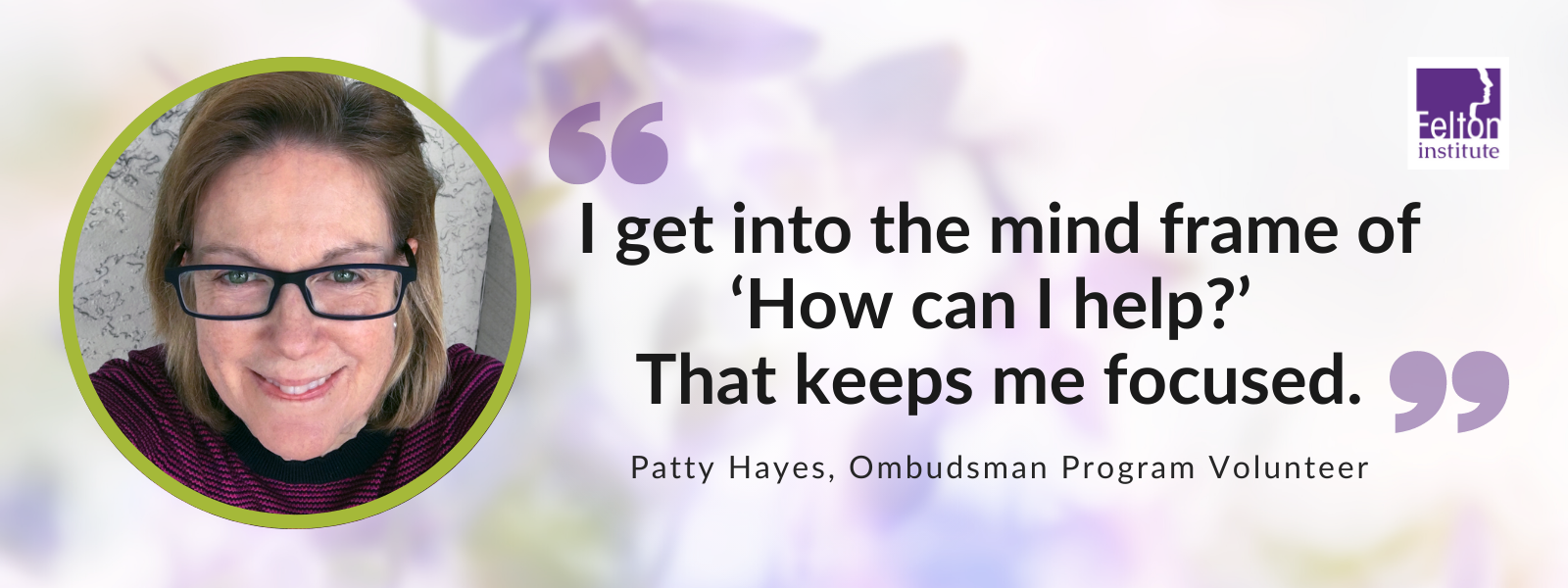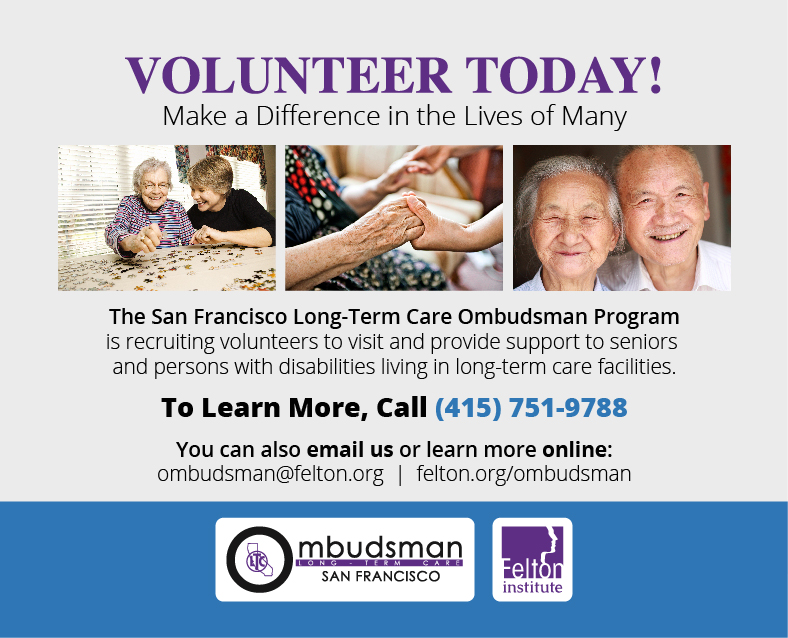Consider having to organize an assisted living situation for an aging family member, perhaps even having to place them in a long-term care residence. You want the best for your loved one, so you’ve done what research you can and found a place that looks nice with staff that seem friendly enough. Do you think about whether your parent or grandparent, aunt, uncle or sibling will be cared for when you’re not around? Will they receive the meals they are supposed to, or be properly bathed more than once a week or month, will they be spoken to humanely? Patty Hayes thinks about these things. She thinks about them, a lot.
“It’s been my observation, whether it’s a hospital, short-term and long-term care facilities, there’s a lack of people. The staff is rushing about, going from one patient to the next, so they’re kind of like a number; there’s a loss of their individual identities and a lack of respect and some dignity.”
Patty volunteers with Felton Institute’s Ombudsman Long-Term Care program, a federally mandated visiting advocacy program that investigates complaints regarding the health, safety, welfare, and rights of older adults and people with disabilities living in long-term care facilities. She has gone through the extensive training program to become certified to do the work of keeping watch over adults in the later years of their life; a time, she says, when they are at their most vulnerable.
“You know, as they age, different things come up. They lose a bit of their independence. There’s just so many different issues, that it just confirms there’s such a need for resident advocacy. From the minute I walk into one of the rooms, they know I’m not coming there to take something from them or tell them to do something. I’m there for them; to support them, and to hear them. I feel the immediacy of that and how their eyes light up – I may be the first person on the outside that they see that day.”
In conversation, Patty’s passion for this aspect of her work can be felt in everything she says, as well as everything she doesn’t. It comes from her own experiences with her own mother and uncle and the issues that took them to short-term care and nursing facilities. Those experiences highlighted just how fortunate she was to be available and have siblings that were available to help and watch for things that would otherwise have gone unnoticed.
“[They] become more vulnerable to some things [they] wouldn’t have let slip; because they feel like, ‘Well, what am I going to do?” She says, speaking on their feeling unable to address various inadequacies in the care they receive. “So being an advocate, you can kind of give them that confidence and support them. You can say, ‘No, this isn’t right,’ and stand up for them and stand by them”
And stand up for them, she does.
In the year and a half that she’s been doing this work, Patty has had to advocate in situations ranging from a resident being overlooked and just wanting the opportunity to sit outside on a nice day, to one whose therapy and social interaction items on his care plan had ceased and were falling through the cracks – the family didn’t even have access to the care plan to know the services to which they were entitled. Patty was able to get them access to their plan and services resumed.
In other cases, services as basic as bathing had been neglected. One resident was supposed to receive a proper shower three times a week but hadn’t received a single shower in a month. These are the scenarios Patty enters to reconnect the dots and save the personhood of those for whom she cares.

Her attentiveness includes sometimes means something as seemingly mundane as walking down the hall and striking up a conversation with a person sitting alone in a wheelchair, and in one such interaction, making an interesting connection.
“She’s a native San Franciscan,” she says. “About the same age as my own mother, and grew up in a similar neighborhood, and we just have this wonderful conversation about her background and life experience. You just have these highs and lows in that.”
If it sounds like she is a hero, it’s because she is. Patty enters these spaces not only to right the ship when it’s gone off course, but to look residents in the eye and tell them they are seen, and heard, and cared for – that they are not alone. While it’s not always an easy gig, it’s one she would never shy away from. “There are some sweet experiences,” she says, “and then others that break your heart. So, you know, it’s life. But you do help in some way you really do, it’s gratifying.”
If you’d like to learn more about Ombudsman services, or becoming a volunteer Ombudsman, click here for more information.
About Felton Institute: Founded in 1889, Felton Institute responds to human needs by providing cutting edge, evidence-based mental health and social services that transform lives. Felton Institute is a tax-exempt organization registered 501(c)(3) nonprofit under EIN 94-1156530.
Offering more than 50 acclaimed and honored programs that address homelessness, mental health, prenatal, adolescent, adult, and senior needs, Felton Institute provides services in San Francisco, Alameda, San Mateo, Marin, and Monterey counties. Felton’s social services and programs utilize the latest scientific research, combining cultural sensitivity, deep respect for client and staff, and a commitment to social justice.
Felton is the oldest non-sectarian and nonprofit social services provider in the City and County of San Francisco. For over a century, Felton Institute has been at the forefront of social service innovation, pioneering new approaches to meet underserved populations’ emerging needs. At the heart of our work is the belief that individuals and families in crisis must have access to services and resources to help them build on their inherent strengths and develop self-sufficiency. www.felton.org

